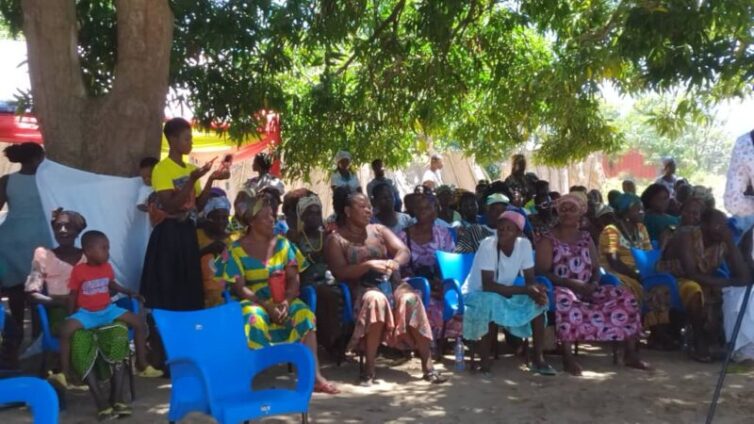As part of the International Day of Rural Women, the Strengthening Investments in Gender-Responsive Climate Adaptation (SIGRA) Project, led by Cowater International and funded by the government of Canada, took center stage in Dzita Agblwdomi in Ghana’s Volta Region.
The event, a celebration of the resilience of rural women in the face of climate change, brought together community members, government officials, and development partners.

In her keynote address, Lauren Intven, Team Lead for the SIGRA project, emphasized the unequal impact of climate change on rural women. "We’re all feeling the effects of climate change, but the impacts are not equal. They differ from community to community and from person to person, depending on resources like land and access to finance. Rural women face some of the heaviest burdens of climate change," she said.

Resilience and Innovation in the Face of Adversity
The celebration focused on sharing the unique challenges rural women face in a changing climate and recognizing their ongoing efforts to support their families and communities.
Throughout the day, women showcased their innovative approaches to tackling climate-related issues, demonstrating their leadership in climate adaptation strategies.

The SIGRA project has been a crucial driver in these efforts. Funded by Global Affairs Canada, SIGRA is working across five districts in Ghana, including the Volta Region’s Anloga and Akatsi North Districts. The project aims to increase access to climate finance and ensure that women and marginalized groups are at the forefront of adaptation initiatives.
Through partnerships with women-led civil society organizations, SIGRA helps local governments incorporate the specific needs of vulnerable groups into their climate resilience strategies.
Intven highlighted that SIGRA is working closely with the Anloga District Assembly to conduct climate vulnerability assessments, leading to the prioritization of fish farming in Fuveme and potable water extension in Agbledomi for the first year of the project’s three-year grant funding. “Climate impacts are local, and so must be the solutions,” she stressed, commending the Tegbi cultural group for their community-driven efforts.
A Call for Greater Support for Rural Women

Mrs. Thywil Eyra Kpe, Volta Regional Director of the Department of Gender, underscored the significance of rural women’s roles in food security, stating that women make up 52.3% of the region’s population, and the majority live in rural communities. “Rural women are the backbone of our agricultural value chain, and their contributions are critical for national food security and economic growth,” Kpe remarked. Despite their vital roles, she noted that rural women continue to face daunting challenges, including limited access to land, financial resources, and agricultural inputs.
The District Chief Executive (DCE) for Anloga, Seth Yormewu, applauded the hard work of rural women in agriculture and highlighted the role of the SIGRA project in helping alleviate some of their challenges. However, he acknowledged that the road ahead is not without obstacles and urged greater support from the government, organizations, and individuals to help women overcome financial constraints and improve their businesses.

A Vision for the Future
The celebration marked a significant moment in the ongoing efforts to recognize the invaluable contributions of rural women to their communities and climate adaptation.
As Ghana faces increasing climate-related risks, projects like SIGRA play a vital role in empowering women, especially those in rural areas, to build resilience against the impacts of climate change.
The International Day of Rural Women, first observed in 2008, continues to highlight the critical role rural women play in agricultural development, food security, and poverty eradication. As climate change intensifies, their role in shaping a sustainable future becomes even more crucial.
The event concluded with a shared commitment to build stronger partnerships and invest in local solutions to climate challenges, ensuring that women’s voices and needs remain at the forefront of Ghana’s climate adaptation efforts.
Latest Stories
-
Experts warn AI bias could undermine safety and security
16 minutes -
Ministry of Works and Housing inaugurates State Housing Company board, 2 others
21 minutes -
Parliament, FCDO, World Bank launch capacity-building initiative to boost economic and financial governance
50 minutes -
Bar Association should encourage every lawyer to take on some pro bono work – Justice Amaleboba
1 hour -
Trailer for Ghana’s first kids podcast ‘Best Girlfriends’ premiered
1 hour -
Ghana to host rescheduled WAFU B U20 Boys Cup in July 2025
2 hours -
One thousand young professionals to get mentoring from FMCG Incubation Programme
2 hours -
Producer price inflation falls sharply to 10.25% in May 2025, lowest since Nov. 2023
2 hours -
Choosing the right IT management partner and maximising the relationship (Part 2)
2 hours -
MP’s role is about representation, not educational qualifications – Justice Amaleboba
3 hours -
Analysis: Fitch upgrade signals turning point for Ghana’s economy, but risks persist
3 hours -
AbibiNsoma Foundation and FIDEP Foundation call for democratic oversight of emerging climate technologies, supports global non-use agreement on Solar Geoengineering
3 hours -
Costly rollover contracts to sink Ghana’s troubled cocoa sector even deeper
3 hours -
The NSS Scandal: Here’s why the new DG’s defence of ghost names digital platform/metric app is shocking
3 hours -
Standard Chartered empowers next generation of girls to embrace their periods proudly
3 hours

